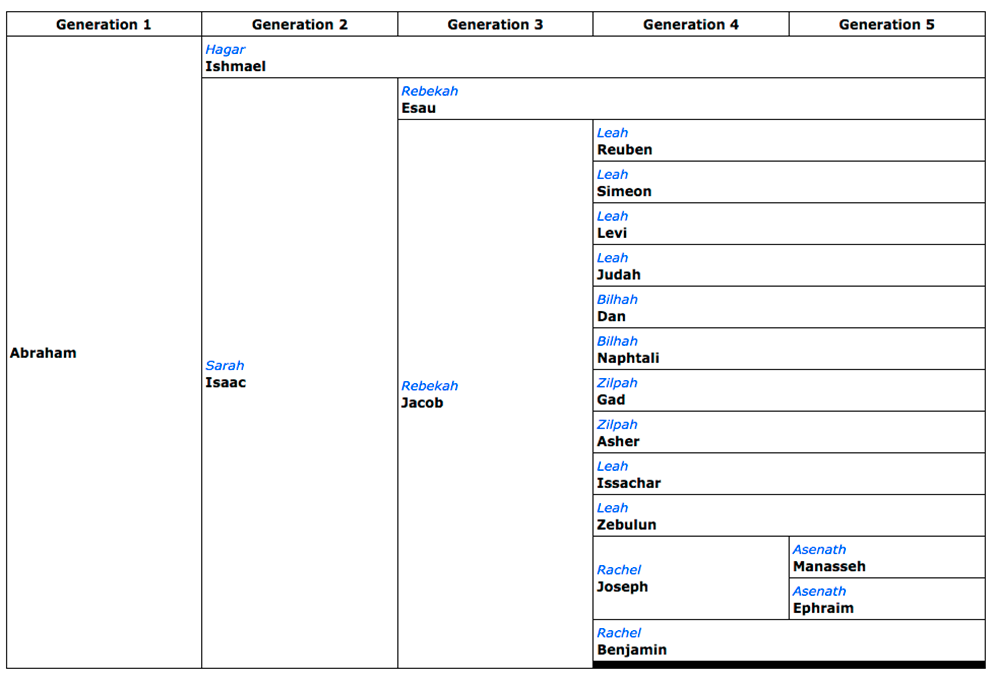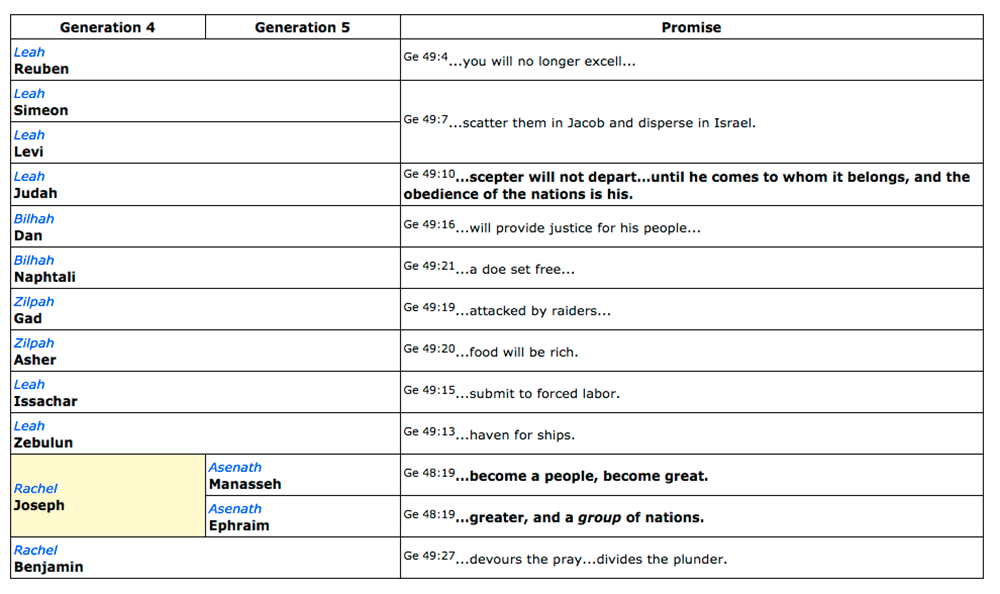
Jacob fathers twelve sons. Those sons also participate in Abraham's covenant but they do not all claim the entire covenant. Certain pieces of the covenant move to certain sons. When we eventually do find each tribe, those tribes will be holding certain national components of Abraham's covenant. This article explores which promises land on which sons.
While Jacob had been in Padan Aram he had 11 of his 12 sons. The last son, Benjamin, would be born on the way home, at the place today marked by Rachael's tomb between Jerusalem and Bethlehem. There is much we could say about this family and the sons, but in this section we are tracking the promises and covenant components that were given to Abraham and passed to his sons, so we will defer from exploring the other interesting stories about these men.
Israel's favorite son, Joseph, would be sold into slavery in Egypt by his ten older brothers. While in Egypt, he becomes Prime Minister of the coutry, second only to Pharaoh, and in that office is given a wife. By her, he has two sons, Manasseh and Ephraim. When Jacob finally gets around to blessing each of his sons, he will include these two sons as 13th and 14th sons, bringing the total number of names which make up any list of names of the tribes to 14. 14 total tribes.
As background, be aware: The tribes are usually listed as 12 not 14. But, whenever the 12 tribal names are listed, some set of the 14 names are given. The missing names giving a clue as to the purpose of the list. The normal pattern for missing tribes is that the names Levi and Joseph are ommitted, and the remaining 12 names being the "landed tribes" of Israel. This general rule, though is often changed for other reasons.
A good memory peg for this is to consider than in any 14 day period two days will be days of rest, without work. Of the 14 men mentioned in this list, 2 are always ommited and they are called by "12".
The following table shows the names of each generation from Abraham to Manasseh and Ephraim. Blue Italics are used to indicate mothers.

All the promises to Abraham passed on to Isaac. There were no changes at this generation since Isaac was the promised son. Similarly Abraham's promises passed from Isaac to Jacob. Not because Jacob deserved them, but because Esau dispised his birthright and so God allowed Jacob to purchase that birthright and to steal Esau's blessing.
By the time of the sons of Jacob, though, there are 14 names which will be getting the promises to Abraham, and they do not just pass to the next generation. They split apart, landing on various members of the family. Members who will become ancient tribes, and later, modern nations. Note that there was a 5th generation under the other brothers but for the purposes of covenant making and eventual tribal and national fulfillment, those other sons do not matter. Indeed, Joseph was told that if he had further sons they were to be reconciled under their brothers Manasseh and Ephraim.
For our purposes here we are going to now shorten the list and only look at the 4th and 5th generations from Abraham. What we want to know is what promises, which are really covenant components, land on which of the tribes.
This list of promises is given to these men after they have gone down to Egypt. Jacob is on his death bed and it is time to tell his sons what will befall them later, when God's promises have reached their full fulfillment. As verse 1 of Genesis 49 states and we will be demonstrating clearly here shortly, these promises focus their attention on what will have happened to the nations they are starting, in the years before the end of the age. Thus, these are all end-times promises and not promises relating directly to either the individuals over which they are spoken or their mid-time (Old Testament era, since the "Last Days" began with Acts 2) descendants.
Whereas the promises to Abraham, Isaac and Jacob where all given to individual men, now start to spread out. Remember, the promise had been to turn this family into a group of nations, and that requires the seperation of the family into multiple, competing groups, which is what now is about to happen. The promises, and the tribes through which they will fulfill will now spread out as God starts working his people towards their fulfillment.
By the end of the Book of Genesis, we find the promises explictly spread out among the patriarchs, with no one brother's line being a recipient of all the promises. The following table quickly summarizes these promises with their essential details.
As you look through the following table, pay careful attention to two important tribes, Judah and Joseph. These two are the only ones with significant promises landing on them. Joseph gets the longest portion, and Judah a close second. The other tribes, except perhaps for Dan, get what could be call "fortune cookie" promises, not usually anything significant. Two, Simeon and Levi seem to be down right cursed, being told they will be dispursed into the other tribes.

The tribes themselves, called families until later, will keep more or less to themselves, and at the time of the Exodus from Egypt, will number many thousands. When Moses surveyed this massive croud, one he could number, he proceded to pronounce a blessing on the people. May you increase "a thousand fold" from what had left Egypt. This thousand fold increase suggests that this party, and the nations promised to some of these brothers, would encompass many millions of people. This number is captured primarily in the community of nations promised to Ephraim, the only brother upon whom the original promise to Abraham of 'many nations' is bestowed.
And speaking of the promise to Ephraim, it is important to note here that, prior to giving the abovementioned promises to his sons, Jacob had taken Joseph and his two sons - Ephraim and Manasseh - aside and passed on to the younger of them, Ephraim, the family birthright, just as Isaac had bestowed it on Jacob many years before when he was but a youth. At that time, Jacob had deceived his father into believing he was Esau, the elder son, so as to cheat Esau out of his brithright. Many Jews and Christians forget that the birthright, and the accompaying blessings that went with it, were bestowed upon Ephraim and not Judah.
For those readers who may be unaware of the relevance of this statement, let it be noted that the Jews are the descendants of Judah, and at this stage in our study, the descendents of Ephrain are still unknown (to identify them is the a major purpose of our quest). The promise of becoming a great nation was not given to Judah, it was given to Manasseh and Ephraim only, and a promise of being the greater of the two, and a group of nations, was made to Ephraim, the recipient of the birthright. This thows a completely different light on the concept of the Jews - the descenents of Judah - being "God's chosen people". All Judah was promiseed was that the scepter (the rule and administration the laws of God) would be Judah's until He who comes to whom that task belongs - Christ, the Messiah - and the obedience of the nations would be to Him. This came to pass after Christ's death and resurrection; Christ having fulfilled the Law, there was no longer a law in force for Judah to administer. Judah's role in God's plan was therefore completed.
As Genesis 26:4 says that through Abraham's offspring all nations on earth will be blessed, the question that now begs asking is, though the seed of which among the 12 brothers would the nations of the earth be blessed? This is not stated, but there are two options - either it is through all their seed as all are of the seed of Abraham and, or it is only through him to whom the birthright is given. Between the time of Abraham receiving the promise in Genesis 26 and Jacob passing on the brithright to Ephraim in Genesis 48, the birthright has been passed on twice from father to son - first by Abraham to Isaac (Genesis 26) asnd then by Isaac and God to Jacob (Genesis 28). In both these instances, the blessing of the nations is referred to as part of the benefits of the birthright, just as the promised regarding possession of the land.
The blessing of nations through their seed was never spoken over Isaac's half-brother, Ishmael, in fact God specifically stated that Ishmael was not the recipient of any of the covenant promises (Genesis 17). Jacob's brother, Esau, was not the recipient of any of the covenant promises either, in fact Isaac did not pass them on to Jacob when he gave him his blessing. It was God who spoke to Jacob and gave them directly to him, perhaps because Jacob had obtained the family birthright through deception, and it was therefore perhaps not strictly legal and binding.
Either way, the covenant promise of blessing the nations through their seeds was passed on to the individual and not their siblings on both occasions, so it is reasonable to assume that again, with Jacob's sons, when the birthright was passed on to Ephraim, the covenant promises applied to Ephraim's seed only and not to the seed of his siblings. We cannot state categorically that this is so, but the precedent set with Isaac and Jacob, whose line Ephraim followed, would indicate it is. Thus it would appear that, through Ephraim's line, the promise of the nations of the earth be blessed would be fulfilled.
During Israel's blessing of his sons, there is no mention as to upon whom the promise of the land as an inheritance has been bestowed. To Israel the land was simply stated as being given by God to Israel and to his seed. As the land appeared to be part of the family birthright (Ishmael and Esau, though both sons, missed on on the promise of land because they were not recipients of the inheritance), it is fair to assume that the land went to the birthright recipient - Ephraim. However, this is not stated, so we must wait until God makes a covenant with the Children of Israel at Sinai for clarification of this.

Design by W3layouts